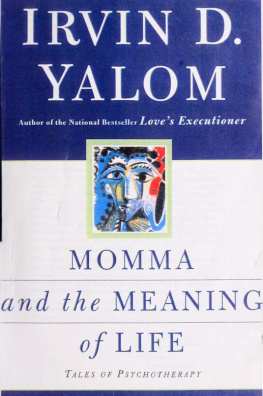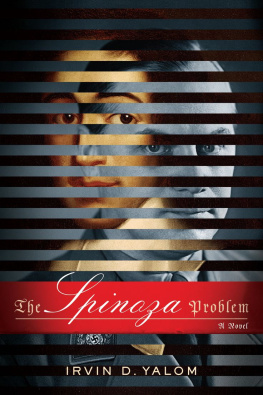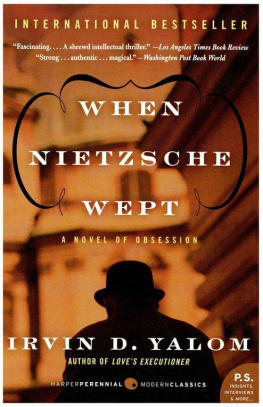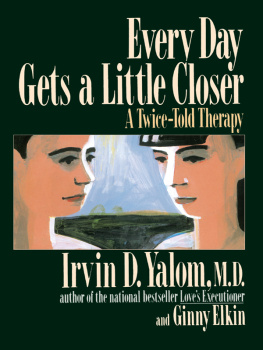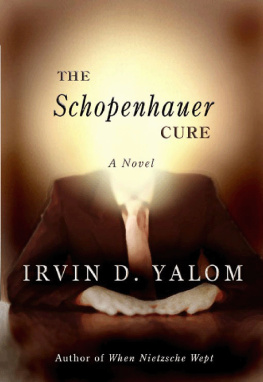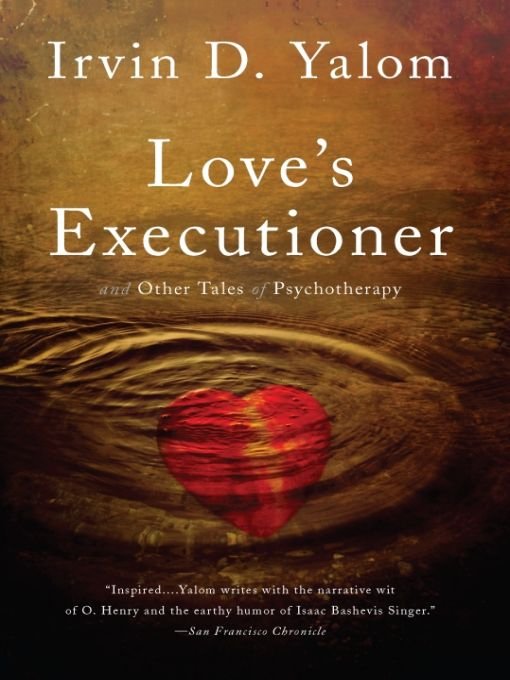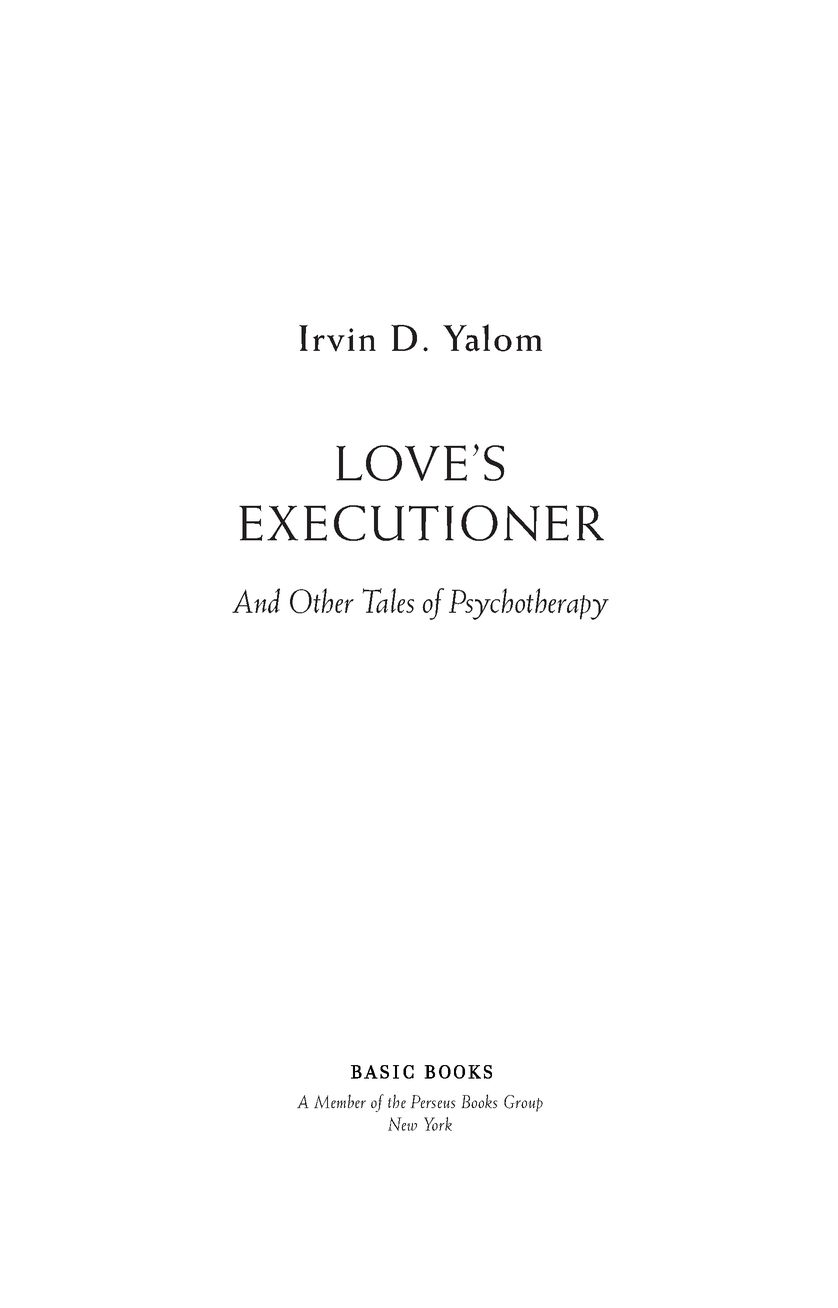Table of Contents
OTHER WORKS BY IRVIN D. YALOM
The Theory and Practice of Group Psychotherapy
(Fifth Edition)
Existential Psychotherapy
Every Day Gets a Little Closer:
A Twice-Told Therapy (with Ginny Elkin)
Encounter Groups: First Facts
(with Morton A. Lieberman and Matthew B. Miles)
Inpatient Group Psychotherapy:
The Theory and Practice of Group Psychotherapy
(Fifth Edition)
When Nietzsche Wept
Lying on the Couch
The Yalom Reader
(edited by Ben Yalom)
Momma and the Meaning of Life
The Schopenhauer Cure
The Gift of Therapy
Staring at the Sun
Im Calling the Police (with Robert Berger)
The Spinoza Problem
To my family:
my wife, Marilyn,
and my children, Eve, Reid, Victor, and Ben
ACKNOWLEDGMENTS
Most of this book was written during a well-traveled sabbatical year. I am grateful to many individuals and institutions who hosted me and facilitated my writing: the Stanford University Humanities Center, the Rockefeller Foundation Bellagio Study Center, Drs. Mikiko and Tsunehito Hasegawa in Tokyo and Hawaii, the Caff Malvina in San Francisco, the Bennington College Creative Writing Program.
I am grateful to my wife, Marilyn (always my toughest critic and staunchest support); to my Basic Books editor, Phoebe Hoss, an enabling editor in this as in my previous books at Basic; and to my project editor at Basic Books, Linda Carbone. Thanks also to many, many colleagues and friends who did not bolt when they saw me approaching, a new story in hand, and offered criticism, encouragement, or consolation. The process has been long and Ive no doubt lost names along the way. But my gratitude to: Pat Baumgardner, Helen Blau, Michele Carter, Isabel Davis, Stanely Elkin, John Felstiner, Albert Guerard, Maclin Guerard, Ruthellen Josselson, Herant Katchadourian, Stina Katchadourian, Marguerite Lederberg, John LHeureux, Morton Lieberman, Dee Lum, K. Y. Lum, Mary Jane Moffatt, Nan Robinson, my sister Jean Rose, Gena Sorensen, David Spiegel, Winfried Weiss, my son Benjamin Yalom, the 1988 class of Stanford residents and psychology interns, my secretary Bea Mitchell who, for ten years, typed the clinical notes and ideas from which these stories spring. As always, I am grateful to Stanford University for providing me with the support, academic freedom, and intellectual community so essential for my work.
I owe a great debt to the ten patients who grace these pages. Each read every line of his or her story (except for one patient who died before I finished) and gave me approval for publication. Each checked and approved the disguise, many offered editorial help, one (Dave) gave me the title of his story, some commented that the disguise was unnecessarily extensive and urged me to be more accurate, a couple were unsettled by my personal self-revelation or by some of the dramatic liberties I took but, nonetheless, in the hope that the tale would be useful to therapists and/or other patients, gave me both their consent and their blessing. To all, my deepest gratitude.
These are true stories, but I have had to make many changes to protect the identity of the patients. I have often made symbolically equivalent substitutes for aspects of a patients identity and life circumstances; occasionally I have grafted part of another patients identity onto the protagonist. Often dialogue is fictional, and my personal reflections post hoc. The disguise is deep, penetrable in each case only by the patient. Any readers who believe they recognize one of the ten will, I am certain, be mistaken.
PROLOGUE
Imagine this scene: three to four hundred people, strangers to each other, are told to pair up and ask their partner one single question, What do you want? over and over and over again.
Could anything be simpler? One innocent question and its answer. And yet, time after time, I have seen this group exercise evoke unexpectedly powerful feelings. Often, within minutes, the room rocks with emotion. Men and womenand these are by no means desperate or needy but successful, well-functioning, well-dressed people who glitter as they walkare stirred to their depths. They call out to those who are forever lostdead or absent parents, spouses, children, friends: I want to see you again. I want your love. I want to know youre proud of me. I want you to know I love you and how sorry I am I never told you. I want you backI am so lonely. I want the childhood I never had. I want to be healthyto be young again. I want to be loved, to be respected. I want my life to mean something. I want to accomplish something. I want to matter, to be important, to be remembered.
So much wanting. So much longing. And so much pain, so close to the surface, only minutes deep. Destiny pain. Existence pain. Pain that is always there, whirring continuously just beneath the membrane of life. Pain that is all too easily accessible. Many thingsa simple group exercise, a few minutes of deep reflection, a work of art, a sermon, a personal crisis, a lossremind us that our deepest wants can never be fulfilled: our wants for youth, for a halt to aging, for the return of vanished ones, for eternal love, protection, significance, for immortality itself.
It is when these unattainable wants come to dominate our lives that we turn for help to family, to friends, to religionsometimes to psychotherapists.
In this book I tell the stories of ten patients who turned to therapy, and in the course of their work struggled with existence pain. This was not the reason they came to me for help; on the contrary, all ten were suffering the common problems of everyday life: loneliness, self-contempt, impotence, migraine headaches, sexual compulsivity, obesity, hypertension, grief, a consuming love obsession, mood swings, depression. Yet somehow (a somehow that unfolds differently in each story), therapy uncovered deep roots of these everyday problemsroots stretching down to the bedrock of existence.
I want! I want! is heard throughout these tales. One patient cried, I want my dead darling daughter back, as she neglected her two living sons. Another insisted, I want to fuck every woman I see, as his lymphatic cancer invaded the crawl spaces of his body. And another pleaded, I want the parents, the childhood I never had, as he agonized over three letters he could not bring himself to open. And another declared, I want to be young forever, as she, an old woman, could not relinquish her obsessive love for a man thirty-five years younger.
I believe that the primal stuff of psychotherapy is always such existence painand not, as is often claimed, repressed instinctual strivings or imperfectly buried shards of a tragic personal past. In my therapy with each of these ten patients, my primary clinical assumptionan assumption on which I based my techniqueis that basic anxiety emerges from a persons endeavors, conscious and unconscious, to cope with the harsh facts of life, the givens of existence.
I have found that four givens are particularly relevant to psychotherapy: the inevitability of death for each of us and for those we love; the freedom to make our lives as we will; our ultimate aloneness; and, finally, the absence of any obvious meaning or sense to life. However grim these givens may seem, they contain the seeds of wisdom and redemption. I hope to demonstrate, in these ten tales of psychotherapy, that it is possible to confront the truths of existence and harness their power in the service of personal change and growth.


